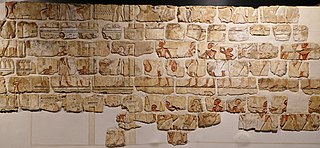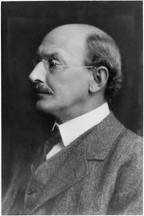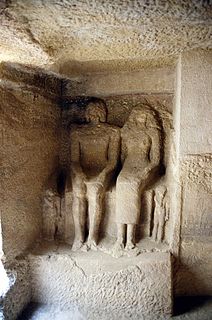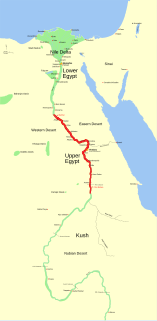Ian Shaw, FSA (born 1961) is an Egyptologist and academic, who was formerly Reader in Egyptian Archaeology at the University of Liverpool. [1]
Ian Shaw, FSA (born 1961) is an Egyptologist and academic, who was formerly Reader in Egyptian Archaeology at the University of Liverpool. [1]
His field work was largely focused in el-Amarna, but in recent times, he has done extensive excavations of mining and quarrying sites from many different Ancient Egyptian periods. He primarily focuses his recent work on methods and mechanics of Egyptian craftsmen and laborers. However, he has produced several works regarding ancient Egyptian warfare; a topic that had long been ignored or only briefly commented on by other researchers.
Besides writing original books, he also has edited several "dictionaries" of Ancient Egypt (which might more correctly be labeled "encyclopedias"; they are in no way lexicons).
On 15 March 2018, Shaw was elected a Fellow of the Society of Antiquaries (FSA). [2]

Khakheperre Senusret II was the fourth pharaoh of the Twelfth Dynasty of Egypt. He ruled from 1897 BC to 1878 BC. His pyramid was constructed at El-Lahun. Senusret II took a great deal of interest in the Faiyum oasis region and began work on an extensive irrigation system from Bahr Yussef through to Lake Moeris through the construction of a dike at El-Lahun and the addition of a network of drainage canals. The purpose of his project was to increase the amount of cultivable land in that area. The importance of this project is emphasized by Senusret II's decision to move the royal necropolis from Dahshur to El-Lahun where he built his pyramid. This location would remain the political capital for the 12th and 13th Dynasties of Egypt. The king also established the first known workers' quarter in the nearby town of Senusrethotep (Kahun).

Talatat are limestone blocks of standardized size used during the 18th Dynasty reign of the Pharaoh Akhenaten in the building of the Aton temples at Karnak and Akhetaten. The standardized size and their small weight made construction more efficient. Their use may have begun in the second year of Akhenaten's reign. After the Amarna Period talatat construction was abandoned, apparently not having withstood the test of time.

Francis Llewellyn Griffith was an eminent British Egyptologist of the late 19th and early 20th centuries.

Egyptian pyramid construction techniques are the controversial subject of many hypotheses. These techniques seem to have developed over time; later pyramids were not constructed in the same way as earlier ones. Most of the construction hypotheses are based on the belief that huge stones were carved from quarries with copper chisels, and these blocks were then dragged and lifted into position. Disagreements chiefly concern the methods used to move and place the stones.
Barry John Kemp, is an English archaeologist and Egyptologist. He is Professor Emeritus of Egyptology at the University of Cambridge and directing excavations at Amarna in Egypt. His widely renowned book Ancient Egypt: Anatomy of a Civilisation is a core text of Egyptology and many Ancient History courses.
Henry Reginald Holland Hall MBE, FBA, FSA was an English Egyptologist and historian. In life, he was normally referred to as Harry Reginald Hall.

The Fraser Tombs are a necropolis located 10 km (6.2 mi) northeast of Al Minya, Upper Egypt. They sit around 2 km (1.2 mi) south of Tihna el-Gebel village, which was an ancient limestone quarry.
Dr Raymond Oliver Faulkner, FSA, was an English Egyptologist and philologist of the ancient Egyptian language.
Alan Ralph Millard is Rankin Professor Emeritus of Hebrew and Ancient Semitic languages, and Honorary Senior Fellow, at the School of Archaeology, Classics and Egyptology (SACE) in the University of Liverpool.
Howard M. R. Williams is a British archaeologist and academic who is Professor of Archaeology at the University of Chester in England. His research focuses on the study of death, burial and memory in Early Medieval Britain.

The Naqada culture is an archaeological culture of Chalcolithic Predynastic Egypt, named for the town of Naqada, Qena Governorate. A 2013 Oxford University radio carbon dating study of the Predynastic period suggests a beginning date sometime between 3,800 and 3,700 BC.
Percy Edward Newberry was a British Egyptologist.
Robert George Morkot, FSA is an archaeologist and academic, specialising in Ancient Egypt. He is a Senior Lecturer in Archaeology at the University of Exeter. His current research is focused on the external relations of Ancient Egypt, particularly the relations with Kush (Sudan). He also works on the historiography of Ancient Egypt.
Rhind Lectures are a series of lectures on archaeological topics. They have been hosted by the Society of Antiquaries of Scotland since 1874. The content of the lectures is usually published in journals or expanded into new works by their authors.
Rosalind Louisa Beaufort Moss, FSA was a British Egyptologist and bibliographer, noted for her work on The Topographical Bibliography of Ancient Egyptian Hieroglyphic Texts, Reliefs and Paintings.
Nancy Margaret Edwards, is a British archaeologist and academic, who specialises in medieval archaeology and ecclesiastical history. Since 2008, she has been Professor of Medieval Archaeology at Bangor University.
Aidan Mark Dodson is an English Egyptologist and historian. He has been Honorary Professor of Egyptology at the University of Bristol since 1 August 2018.

Jack Ogden, FSA, FGA, is a British jewellery historian with a particular interest in the development of Materials and technology. He is considered one of the foremost experts in his field. He is the current President of The Society of Jewellery Historians, having held the position since February 2018, and was appointed Visiting Professor of Ancient Jewellery, Material and Technology, at the Birmingham School of Jewellery Birmingham City University in 2019
Lin Foxhall, FSA, MBE, is a Professor of archaeology and ancient Greek History. She has written on women, men, and gender in the classical world. She is an Honorary Professor at the University of Leicester, and in 2017 she was appointed to the Rathbone Chair of Ancient History and Classical Archaeology at the University of Liverpool.
Valerie Maxfield FSA is a Roman archaeologist and emeritus Professor of Archaeology at the University of Exeter. She is a specialist in the archaeology of the Roman army and frontiers, and edited the Proceedings of the Devon Archaeological Society until December 2020.